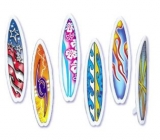Kitesurfing is a highly popular water sport following the massive boom it has experienced over the last 10 years. Although sails for boats and means of locomotion existed since the early 19th century, it was during this century that techniques were refined and improvements were made, definitively launching kites into the market.

The brothers Dominique and Bruno Legaignoux were the first to navigate with skis and a kite in 1987, obtaining the patent for this invention. When Robby Naish discovered it, he became the first windsurfer to take up kitesurfing, promoting it and partnering with the Legaignoux brothers to start manufacturing kites.
Over the years, techniques have improved, and today we can find high-quality equipment. Do you still not know what it consists of?
- Board: There are different models depending on the type of riding you want to do, the kiter's skill level, weather conditions, etc. The most well-known are twin-tip boards (which don’t require changing foot positions to ride in both directions) and directional boards (where you need to turn your whole body to change direction).
- Kite: It can be either inflatable or soft kites. The difference is that the former is more widely used because it allows buoyancy if overturned in water, while the latter is less stable.
- Harness: This helps control the kite and provides greater safety.
- Wetsuit: Protects against possible hypothermia from prolonged exposure to cold water.
- Helmet: Many kitesurfers use one to protect against potential injuries in case of falls.
- Buoyancy aid: Its use is recommended, as it helps you stay afloat if you fall into the water.
If you want to get into this sport, the best approach is to first try it out to see if you enjoy it by taking a kitesurfing course with qualified instructors.

If after trying it you wish to continue your kite adventure, you can then buy all the necessary gear (depending on how often you plan to practise and whether investing in equipment makes sense for you) or rent it on a case-by-case basis from specialised schools and companies.












